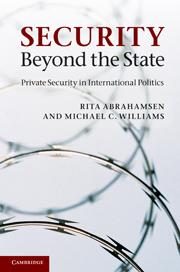4 - Of oil and diamonds
global security assemblages in resource extraction
Published online by Cambridge University Press: 05 June 2012
Summary
In a well-known essay, Zygmunt Bauman compares contemporary capital to the absentee landlords of the early modern age, notorious for their neglect of the needs of the populations that fed them. But, unlike the absentee landlords of yesteryear, Bauman argues, the corporations of the twenty-first century are untied from even the locality of the estate, enjoying a new mobility by virtue of their liquid resources. Thus, if one locality proves too inhospitable, capital can always move on to more welcoming sites when the challenges of doing business require ‘a costly application of force or tiresome negotiations. No need to engage, if avoidance will do.’
Bauman’s metaphor captures an important part of modern capitalism, one that many analysts of globalization – whether proponents or critics – would doubtlessly endorse. But while capital is clearly more ‘footloose and fancy-free’ today than in the past, it does not inhabit a completely deterritorialized world. Corporations still choose to operate in difficult and dangerous settings, providing the rewards are high enough. This is particularly the case in resource extraction, where the mobility of capital is highly qualified; capital is not free, for example, to move from the oil-rich and conflictual Niger Delta to the stormy but non-violent shores of west Wales. Instead, geology is destiny, and the oil companies must stay where the oil and the profit is to be found, and the same is true of companies involved in other types of resource extraction. Bauman’s observation that contemporary capital never has to ‘encounter otherness’ and thus be faced with ‘the temptation to reduce difference by force or take up the challenge of communication’ accordingly requires modification: the continuation of much contemporary global commercial activity involves creating security environments that permit its operations, and PSCs are key intermediaries in these arrangements.
- Type
- Chapter
- Information
- Security Beyond the StatePrivate Security in International Politics, pp. 122 - 171Publisher: Cambridge University PressPrint publication year: 2010

